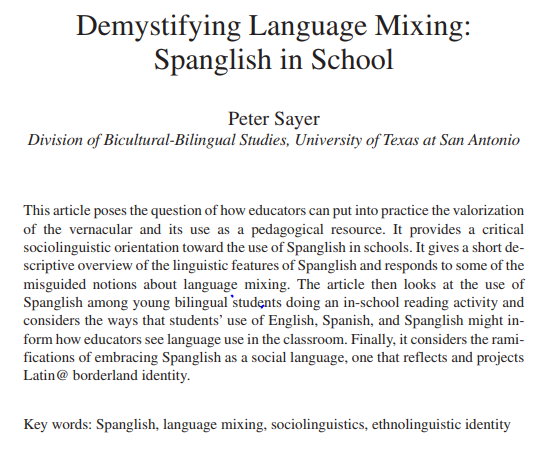Category Scholarly References
Young, V. A., & Martinez, A. Y. (Eds.). (2011). Code-meshing as World English: Pedagogy, policy, performance. Urbana, IL: National Council of Teachers of English. Find the book at worldcat.org/isbn/9780814107003
Sayer, P. (2008). Demystifying language mixing: Spanglish in school. Journal of Latinos and Education, 7(2), 94-112. Find the article at doi.org/10.1080/15348430701827030
Cope, B., & Kalantzis, M. (2000). Design for social futures. In B Cope & M Kalantzis (Eds.), Multiliteracies: Literacy learning and design of social futures (pp. 201-234). London: Routledge. Find the book at worldcat.org/isbn/0415214211
Nero, S. J. (2010). Discourse tensions, Englishes, and the composition classroom. In B. Horner, M-Z Lu, and P. K. Matsuda (Eds.), Cross-language relations in composition (pp.142-157). Carbondale, IL: Southern Illinois University Press. Find the book at worldcat.org/isbn/0809329824
Shelton, C. D., & Howson, E. E. (2014). Disrupting authority: Writing mentors and code-meshing pedagogy. Praxis: A writing center journal 12(1), 77-83. Find the article here.
Fores, N., & Schissel, J. (2014). Dynamic bilingualism as the norm: Envisioning a heteroglossic approach to standards-based reform. TESOL Quarterly, 48(3), 454-479. Find the article here.
Yale Grammatical Diversity Project, English in North America. Find the website here.
Bennett, K. (2007). Epistemicide! The tale of a predatory discourse. The Translator, 13(2), 151-169. Find the article at doi.org/10.1080/13556509.2007.10799236
Smitherman, G. (1996). African-American English: From the hood to the amen corner. University of Minnesota. Find the book at worldcat.org/isbn/1-881221-21-0









